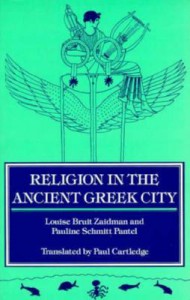Thus Spake Dustin
I love reading about Eastern Orthodoxy, scripture, and nonfiction works that challenge me to expand my view of the world.
Review of Religion in the Ancient Greek City

Louise Bruit Zaidman and Pauline Schmitt Pantel, Religion in the Ancient Greek City, translated by Paul Cartledge (Cambridge: Cambridge University Press, 2004). Pp. 280. Paperback.
After reading about sacrifices at the ancient Jerusalem Temple, I was curious as to how sacrifices were carried out in the Greek world. To answer this question, I turned to this book, which was one that was on my undergrad syllabus - a class with Prof. Sellew. Outside of Walter Burkert's book, Greek Religion, this seems to be the best introduction to ancient Greek paganism.
Originally this book was written in French, and then translated by Paul Cartledge. However, the authors state in their preface that this translation has a number of improvements, so instead of thinking of this as a translation, one could think of it as a second edition.
The main thesis of this book is that one can't approach Greek Religion from our viewpoint. If we do, we tend to impose Judeo-Christian categories and values,which forces us to think about Greek religion in a way that would have been foreign to those who practiced it. If we are careful to study Greek Religion from the framework of the ancient Greeks, we notice that religion, politics, and the civil life were all tied together. This observation is what led them to title the book, Religion in the Ancient Greek City.
Some examples of Judeo-Christian values that we can't impose on Greek religion would be the idea that God is the creator and external to creation - Greek gods were themselves created and a lived within creation, in fact rather than gods, we may want to think of them as immortals; the idea that religion is for salvation; and the idea that religion is governed by a set theology or particular book, such as a Bible.
Another example of us imposing Jude-Christian values on Greek religion is the idea that there are "sacraments" that demarcate various stages of life (birth, marriage, death). While there are rituals and sacrifices that existed for these events, we need to remember that ritual was a part of everyday life, so we shouldn't be so quick to see them as unique events. What was most interesting to me was to see that pagan Greek religion had some practices that exist in modern Greek Orthodoxy, ones that don't exist in Roman Catholicism - such as the wearing of crowns at marriages, and circling the hearth/altar for newborns, and weddings. Though this book isn't interested in making modern day connections, I can't help but wonder if our modern practices don't have an origin in ancient Greek religion.
For the Greeks, religion was more about an interaction with the "divine world," so as to maintain a balance for social and civic stability. This comes out very clearly in the rationale behind sacrifices. The myth of Prometheus and Pandora sets the stage for sacrifices (though this isn't universal). Prometheus makes a sacrifice but withholds the best portion for humankind. Zeus gets angry and takes fire away from humans, but Prometheus steals it back. Zeus, again angry, sends Pandora (which means "gift for all") to humans, but this "gift" unlocks all the ills that now plague humanity. This myth explains why certain portions of the sacrifice go to the gods, and why certain portions are eaten by man. Sacrifices symbolically represent a communion that humanity once had with the gods, yet, at the same time, it also represents the gulf that now exists between the divine and the human. While it connects humanity to the primordial events that set the stage for our current existence, it also shows that "fire," like Pandora, was both a gift and a curse.
The book also explains how sacrifices were done; typically three parts: 1) the promenade, 2) the sacrifice, and the 3) butchering and eating of the sacrifice. It then also explains the various competitions that may have been connected to sacrifices: games, theater, music, etc.
One of the best aspects of this book is the way it places religion in an everyday context. It becomes very clear that libations and other sorts of sacrifices were an integral part of life. Religion is played out not only in the home life (oikos), but also as a part of the overall working of the city-states. The book also discusses how religion was able to unite the Greeks in pan-Hellenic celebrations (the most famous for us being the Olympics or the plays in celebration of Dionysus - think of Euripides, Sophocles, Aeschylus, or Aristophanes).
Another amazing discussion in the book was how to understand the myths, and representation of the gods, as a whole. Whereas most books want to discuss each god individually, this book stresses that a proper understanding of the gods is in relationship to one another, and in relationship to the city in which they were worshiped. Though there are a limited number of gods, the roles they played within society varied depending on the city-state, hence the great number of epithets that existed for each god.
In short, I highly recommend this book to anyone who is interested in how ancient Greek religion worked, and what it meant to those who practiced it. This book will give you a good foundation from which to understand the classical world. It's very readable and not written in a highly academic tone. The only thing it won't do is systematically go through the stories of all the gods - the mythology. However, it will give you a way of understanding classical mythology, if you want to go on and read those stories, and that is very valuable!



